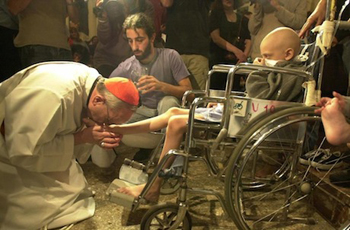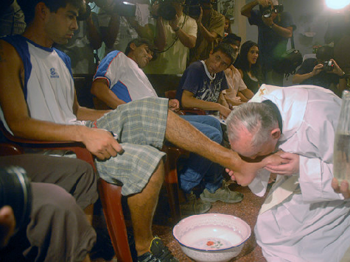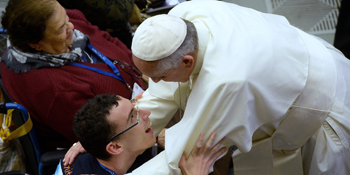For Sunday May 10, 2015
Lectionary Readings (Revised Common Lectionary, Year B)
Acts 10:44–48
Psalm 98
1 John 5:1–6
John 15:9–17
Can the church ever change? The oldest institution in western history?
That's the question that Garry Wills poses in his new book — The Future of the Catholic Church with Pope Francis (2015). Wills is both a fierce critic and a devoted son of the church. Although there are reasons to be pessimistic, his book offers an optimistic prognosis by one of America's most distinguished intellectuals. To say that the church will never change, writes Wills, "it helps not to know much history."
It's believing a fiction to say that the church has had an immutable past, "that the church was always what it has become." That's patently false. The church didn't always have priests (a "failed tradition") and popes. For thirteen hundred years it didn't teach transubstantiation, and for almost nineteen hundred years there was no such thing as papal infallibility.
 |
In ways both large and small, for good and for ill, the church has always changed. Change is the "respiration" of the church, "its way of breathing in and breathing out." And just as it's a fiction to say that the church has had an immutable past, so too is the idea that its future is a foregone conclusion. Wills explores five ways that the Catholic Church has changed across the centuries.
For a thousand years, Latin reigned as the putative common language for a universal church. This despite the fact that almost no one understood it. Latin as Catholicism's "eternal" language expressed itself most powerfully in the liturgy — with the priest's back turned to the congregation, and in Jerome's fourth-century translation of the Bible — which "Vulgate" became "the definitive edition of the most influential text in Western European society." Nonetheless, Latin faded away after Vatican II, "proof that the church could change in the right direction after so many centuries of harmful change."
The church-state relationship has constantly changed. At first, the state ignored the church. Then it persecuted the church. And if Constantine later took over the church, Wills observes, in the high Middle Ages it's just as true that the church took over the sword of the state with its "crusades, inquisitions, interdictions, in the christening and excommunicating of kings." More recently, liberation theology has opposed the state in defense of the poor.
 |
Then there's the "tragic absurdity" of Christian anti-Semitism. At first, Jewish believers welcomed pagan Gentiles into the church. Later, Gentile believers denounced Jews as Christ-killers and satan worshippers. But even on this painful subject there's been genuine progress, including the acknowledgment that the New Testament documents themselves contain anti-Semitic elements. Anti-Semitism is by no means gone, Wills admits, "but it is now ashamed to show its face in decent surroundings."
In his discussion of natural law, Wills explores changing views of contraception, patriarchy, and abortion. By the 1990s, so few Catholics agreed with papal teaching on contraception that those who did were "statistically non-existent." It was a good example of how sometimes church authorities don't exactly retract their positions, "they just accept the fact that the People of God have moved on."
Radical change has even come to one of the sacraments — penance and confession."There used to be long lines at confessionals on a Saturday before a penitent could go to communion on Sunday. Yet now the confessional boxes are being removed, or used by church janitors to store their equipment."
One of the most radical changes in the church is described by Luke in the reading from Acts for this week. It's the story of the Jewish apostle Peter and the Gentile soldier Cornelius. There are many layers to this story, but notice the obvious — that the real convert here, the person who really needs a radical change of mind and heart, is not Cornelius the centurion but Peter the believer. And so he repents and confesses, "God has shown me that I should not call any person impure or unclean."
 |
We should hope and pray and work for a better church. But we should also reject the purist's dream of a perfect church. Jesus described his kingdom as a field of wheat that's infested with weeds, a net full of good and bad fish, and as a field of wheat that needs to be winnowed.
"Nothing in our sinful world is perfect," Wills reminds us, not the church and not the state. Only after the harvest, at the End of this Age, do we enter an ideal community in heaven. Until then, living between the heavenly city of God and earthly city of Man, we do the best we can in an imperfect "third city" here and now.
In Wills's view, Pope Francis knows that the church is not changeless, permanent, or predictable. Indeed, Francis has surprised people with his words and deeds.
He listens to the laity (the sensus fidelium). He refuses to condemn — when asked about gay people, he said, "Who am I to judge them?" Most surprising of all, says Wills, is Francis's admission of "how bad a Jesuit provincial he had been. How often have we heard any pope tell us how wrong he was?"
A pope who admits that he's been wrong, and who believes in a God of surprises, "bodes well for the future of the Catholic Church." Protestants and Catholics alike do well to follow his lead.
Image credits: (1) The Telegraph; (2) YOU Effect; and (3) The Huffington Post.





